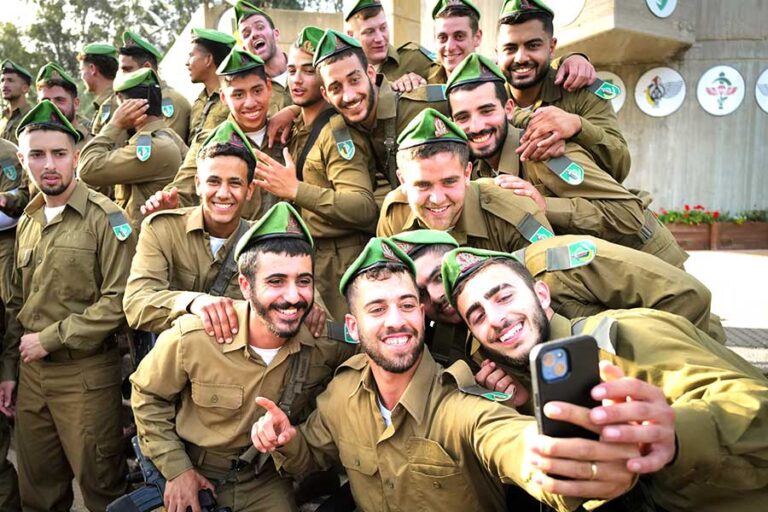Soldiers are usually not associated with piety or theoretical studies. They are strong physically but often not spiritually or intellectually.
Judaism has a different conception. According to Rebbe Yossi HaGelili (Sotah 44a), soldiers who sin, even if only minor infractions, are sent home. Interestingly, the example of a minor infraction that disqualifies a potential soldier is speaking between the laying of the tefillin shel yad and the tefillin shel rosh. Many explain that the tefillin shel yad symbolizes our actions, while the tefillin shel rosh represents our thoughts, faith, and beliefs. A soldier in a Jewish army must ensure that he links his actions to his thoughts and beliefs.
A Purim skit at the Volozhyn Yeshiva emphasized the high spiritual bar set for Jewish soldiers. The skit included a re-enactment of the Torahâs military selection process. After dismissing those with a new wife, home, or vineyard, the officers dismissed those who had committed even minor sins. At that point, all potential soldiers left the stage except those dressed as the Vilna Gaon and the Pânei Yehoshua. They were the only two who could meet that standard.
The ideal Jewish army consists of truly pious soldiers. This is how my ancestor, Rav Avraham (the brother of the Vilna Gaon), explained Yitzchakâs message to Yaakov. After noticing that the son who appeared before him sounded like Yaakov, but his forearms felt like those of Eisav, Yitzchak exclaimed, âThe voice is the voice of Yaakov, but the hands are the hands of Eisav (Bereishit 27:22).â Chazal (Bereishit Rabbah 65:20) explain that Eisavâs descendants’ power over us depends on the strength of our âvoiceâ of Torah learning and tefillah. Their arms are dominant when our voice is weak; when our voice is strong, their arms are not.
Rav Avraham (Maâalot HaTorah, pg. 71) pointed out that Yitzchakâs words actually describe Yaakovâs voice and Eisav’s hands as coexistent. When Yaakovâs voice is strong, Hashem blesses Yaakov with the strength of Eisavâs arms. When Yaakovâs voice is weak, Eisav maintains his strength. When we are spiritually strong, we are also physically powerful.
This is the embodiment of the ideal Jewish army: soldiers whose physical strength is not just a result of their training but also rooted in their spiritual fortitude. They are the living proof of the integration of what Chazal referred to as the sifra (book) and saifa (sword).
Todayâs Revolution
Baruch Hashem, we are witnessing a revolution in this area. Though no soldier can match the Vilna Gaonâs or Pânei Yehoshuaâs piety, we have thousands of IDF soldiers who are both deeply committed to halacha and Jewish values and are genuine talmidei chachamim. Young scholars, many of whom have already finished Shas, serve in the regular standing army, and Roshei Yeshiva and Ramim serve in the reserves.
The founding Roshei Yeshiva of the Hesder Yeshivot did not serve in combat roles. That has changed as a second and third generation of Roshei Yeshiva has emerged. For example, Rav Chaim Sabato (Maaleh Adumim) and Rav Yaakov Meidan (Har Etzion) fought brutal battles in the Yom Kippur War, while Rav Baruch Wieder (Yeshivat HaKotel) miraculously survived the Lebanon Warâs bloody tank battles.
They and hundreds of other Roshei Yeshiva and Ramim have served as role models for and inspired tens of thousands of talmidim over the past fifty years. When forced to leave the Beit Midrash to fight our enemies, these talmidim take their sefarim with them. They are deeply committed to protecting Am Yisrael on the battlefield and continuing their Torah studies and growth while they do so.
Never before in our history have we had such a significant presence of talmidei chachamim in a Jewish army. If the Volozhyn Purim skit took place today, far more than two people would be left standing on the stage. The stage would be full of many units.
Appreciating This
While our focus over the past eight months has been on those killed, wounded, and kidnapped, we should also appreciate the special times we are living in â when the vision of a Torah-true army is beginning to become a reality.
As we approach Chag Matan Torah, we should take pride in the fact that we are beginning to realize the Torahâs conception of what a Jewish army should look like.
May we appreciate the commitment of our holy soldiers to Torah and Torah values. Their dedication is a beacon of hope. May their commitment and dedication merit the arrival of the day when they will no longer have to leave the Beit Midrash for the battlefield.


